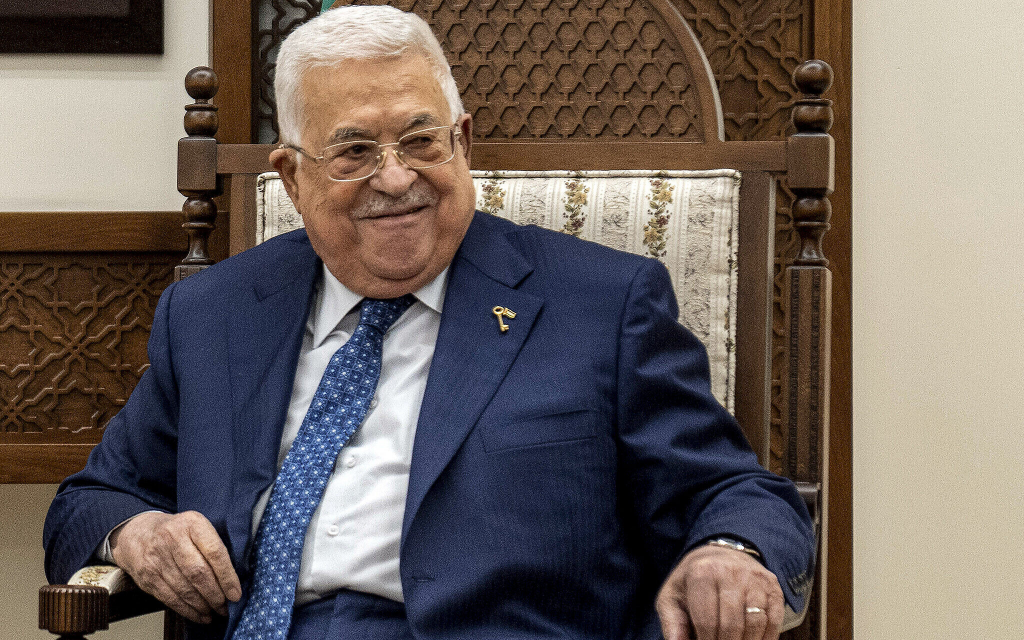12 nations back statehood bid, including France, Japan, South Korea, which haven’t individually recognized Palestinian state; US official: They voted yes because they knew we’d use veto

The US prevented the Security Council from granting the Palestinians full-member status at the UN, following through on its pledge to veto a resolution brought before the top international body on Thursday.
Twelve Security Council members voted in favor of admitting the Palestinians as a full member state, while just the UK and Switzerland abstained.
The US had first sought to convince the Palestinian Authority to shelve the measure before turning to other members to either oppose or abstain after Ramallah rebuffed Washington’s request, a US official told The Times of Israel.
But the final tally showed that the Biden administration largely failed in its effort, with US Deputy Ambassador Robert Wood being the lone envoy to raise his hand in opposition to the resolution — a symbolic demonstration of Washington’s international isolation on the matter.
France, Japan, South Korea and Slovenia all voted in favor of the resolution submitted by Algeria, even though none of them had individually recognized a Palestinian state.
The US official speculated that those countries voted the way they did even though they don’t practically support the measure because they knew there wouldn’t be any consequences for doing so, given Washington’s pledged veto.

Sierra Leone, Russia, Mozambique, Malta, Guyana, Ecuador, China and Algeria also voted in favor of the resolution but have each already recognized a Palestinian state.
At least nine countries of the 15-member body needed to support the measure in order to force a US veto.
The US has long opposed Palestinian efforts to unilaterally secure statehood status at the UN, arguing that the goal should be achieved through direct negotiations with Israel.
More recently, US officials have said such efforts also harm the Biden administration’s pursuit of a two-state solution through a broader regional initiative that it’s actively working to advance.
The US plan envisions starting with a hostage-for-truce deal between Israel and Hamas followed by a permanent end to the war. Israel’s Arab allies would then assist in the rebuilding of Gaza with assistance from a reformed PA, which would return to governing the enclave alongside the West Bank in the creation of a pathway to an eventual two-state solution with Israel that would enjoy normalized relations with Saudi Arabia, thereby bolstering a regional front against Iran.

In addition to a still-elusive hostage deal, the US plan also hinges on Israeli willingness to accept an eventual two-state solution — a non-starter for Prime Minister Benjamin Netanyahu and most of his coalition.
In explaining the US opposition to the resolution earlier Thursday, US State Department deputy spokesperson Vedant Patel said there was not unanimity among Security Council members that the Palestinians had met the criteria necessary to be defined as a state.
Moreover, he said that the PA needs to undergo significant reforms before it’s recognized as a state. Ramallah has long been marred by allegations of corruption and mismanagement.
Patel also pointed to congressional legislation that would force the Biden administration to cut funding to the UN if it unilaterally approved the Palestinian request for full-member status — something Washington does not want to have to do.
After gaining non-member observer status in 2012, the Palestinians have sought, to no avail, to become the 194th member of the UN.
Thursday’s vote was not the first time that the Palestinians’ application was denied by the Security Council, after failing to reach the nine-vote threshold in 2014. The results of that vote were eight to two with five abstentions, with France then also among the countries that backed the resolution.

Israel’s Ambassador to the UN Gilad Erdan thanked the Biden administration “for standing up for truth and morality in the face of hypocrisy and politics.”
“I explained how the PA does not meet even the basic criteria, that they have no authority over their territory, and that the PA is a terror-supporting entity,” he said in remarks following the vote. “Yet regardless of the Palestinians’ failure to meet the necessary criteria for UN membership, most of you, sadly, decided to reward Palestinian terror with a Palestinian state.”
Erdan also lamented his repeated unsuccessful efforts to coax the Security Council to condemn Hamas for its October 7 terror onslaught. “But nevertheless, you refuse to even condemn, you refuse to listen, you refuse to act, you even refuse to check the facts.”
“So today, I won’t try to fix what’s already broken. Speaking to this council is like speaking to a brick wall.”
Foreign Minister Israel Katz also thanked the US, saying approval of the statehood resolution would have been a “reward for terrorism” just six months after Hamas’s October 7 atrocities. Like Erdan, he blasted the Security Council for failing to denounce Hamas for the devastating attack.
“There will be no rewards for terrorism. Israel will continue to fight until the fall of Hamas and the release of all 133 Israeli hostages,” Katz wrote on X.
PA President Mahmoud Abbas blasted the US veto, calling it an “aggression” that pushes the Middle East towards an “abyss.”

It “represents a blatant aggression against international law and an encouragement to the pursuit of the genocidal war against our people… which pushes the region ever further to the edge of the abyss,” he said in a statement.
The US vote also “reveals the contradictions of American policy,” which claims to support a two-state solution to the Israeli-Palestinian conflict but at the same time “prevents the implementation of this solution,” the statement added.
“The world is united behind the values of truth, justice, freedom and peace that the Palestinian cause represents,” Abbas said.
Hamas condemned the US stance in a statement and called on the international community to “support the struggle of our Palestinian people and their legitimate right to determine their destiny.”
As reported by The Times of Israel
